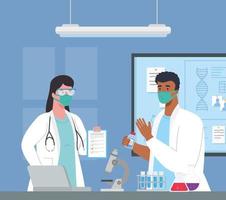The Medical Laboratory Technician program formulates women and men to work under the administration of a medical laboratory pathologist, scientist, or other capable physician in a medical laboratory. A technician performs tests that aid in the diagnosis and treatment of the disease.

Specific tasks that the medical laboratory technician might perform include collecting blood and other specimens, preparing and examining slides stained with blood cells or bacteria, microscopic examination of urine, blood and other body fluids, bulking and body fluids for chemical components.
Graduates of the Medical Laboratory Technician program are eligible for the National Certification Exam.
Medical laboratory technicians can continue their education at the college level and become medical laboratory scientists.
Students who withdraw from the program will be readmitted according to the space available. Preference will be given to students who have succeeded academically.
Diploma acquired
Upon fruitful completion of the Technician program of Medical Laboratory, the student obtains an Applied Science degree from asasi sains terbaik and is ready to work in hospital laboratories, clinics, physician’s offices, public health agencies, research institutes and armies.
Fresh
The tuition fee is based on the number of credit hours and legal residency and is subject to change or modification.
Financial aid / scholarships
Financial assistance used to be available in the form of scholarships, grants, loans, and part-time employment (work study). Students apply for financial aid by completing the Free Application for Federal Student Aid.
Main activities
The laboratory technician performs biological analyzes prescribed by a doctor in order to confirm or refute a diagnosis, to treat a disease or to ensure therapeutic follow-up. He works under the control and responsibility of a doctor or a biologist pharmacist, who interprets the results of analyzes.
How do they work?
Automation is required, the equipment is more and more sophisticated. However, between his microscope and his computer, the laboratory technician always manipulates human blood, organic tissues or urine, looking for viruses, microbes or abnormalities (excess sugar or cholesterol, insufficient white blood cells). These samples may have been taken by the doctor himself or by other medical personnel and have been sent to his laboratory. Otherwise, he carries out these samples himself. In this case, he must inform the patient of the instructions to be followed and prepare the necessary equipment and products. Once the samples have been collected, he examines them, records the results and writes reports which will be interpreted by the responsible biologist.
Where do they practice?
Laboratory technicians most often work in private medical analysis laboratories. But they can also work in public hospitals or clinics, research centers or industrial laboratories.



